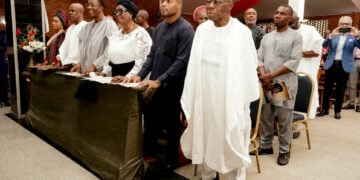Farmers in south-western states have lamented the structural inequalities that have long excluded them from agricultural decision-making and resource allocation, even as they have demanded equitable representation in Nigeria’s revised agricultural gender policy.
They drew attention to their plight at the South-West Zonal Consultative Forum, which was organised over the weekend in Lagos by the Federal Ministry of Agriculture and Food Security (FMAFS) in collaboration with the National Gender Steering Committee (NGSC) and supported by ActionAid Nigeria, GIZ and the International Centre for Environmental Health and Development (ICEHD).
The revised National Gender Policy in Agriculture (NGPA) for 2025-2030 in Nigeria is a policy framework aimed at ensuring equal access and control of agricultural resources for both men and women, thereby promoting food security and accelerating development.
It addresses gender inequalities in agriculture by reducing biases, unequal power relations, and gaps in access to assets and decision-making processes. The policy emphasises women’s crucial role in agriculture and seeks to move them from subsistence farming to higher-value, market-oriented production.
For instance, a cassava farmer from Ekiti State, Mrs. Ronke Ajayi, told LEADERSHIP at the forum that, “We farm, we sell, we feed the nation, but when grants and equipment are shared, we are not even on the list. We want to be part of the system, not as an afterthought but as equals.”
A 27-year-old agritech entrepreneur from Ogun State, Ayodeji Alabi, said young people are brimming with solutions but are often left out of policy dialogues, adding that, “We are not begging for charity, but we are asking to be recognised. Give us infrastructure, access to finance, and inclusion in policy structures and we will transform agriculture.”
Also present were persons with disabilities, who voiced a rarely discussed concern: systemic invisibility. For instance, a visually impaired participant from Osun State, Grace Olayemi, called for agricultural tools and training tailored to people living with disabilities.
“You cannot farm when the tools are not built for you, when the training is not accessible, and when planners don’t even consider your existence,” she said.
The event was opened by the director of Special Duties at FMAFS, Mrs. Kachalla Zara Damaturu, who emphasised the importance of listening to underrepresented voices. “Gender is not a women’s issue, it is a justice issue. The revised policy must reflect the realities of those who feed this country,” she said.
A national consultant on the policy, Barr. Nkiruka Stella Okonkwo, outlined the NGPA’s vision, which draws from frameworks such as the Revised National Gender Policy (2021), NATIP 2022–2027, ECOWAP, and the AU’s Agenda 2063.
“We are moving away from tokenism. This is about intersectionality, recognising that women, youth, PWDs and displaced persons face unique challenges that must be addressed in policy,” Okonkwo stated.
Key recommendations from the participants included enforcing gender and disability quotas in cooperatives and agricultural input schemes, translating training into indigenous and sign languages and establishing innovation hubs for youth and women.
A Lagos-based social worker who supports orphaned and displaced children, Temitope Ogunlana, warned that the nation risks losing a generation of future food producers if vulnerable groups remain excluded.
A cooperative leader from Oyo State, Mr. Kayode Alade, echoed the sentiments of many, stating, “This policy must not become another document that gathers dust. We must see it in action, in our farms, markets, and lives.”
The Lagos consultation is part of a nationwide series of zonal engagements that will inform the final draft of the 2025–2030 NGPA. A national validation workshop is scheduled for September in Abuja, ahead of the policy’s official launch.
With agriculture employing over 70 percent of Nigeria’s workforce, stakeholders say the revised gender policy presents a critical opportunity to build a more inclusive, equitable and resilient sector.





